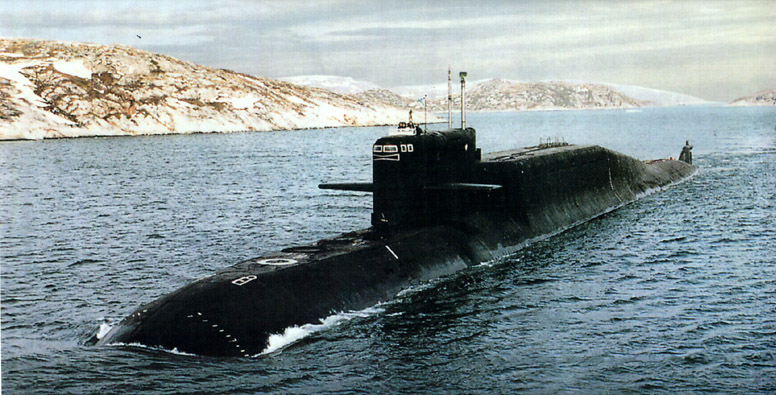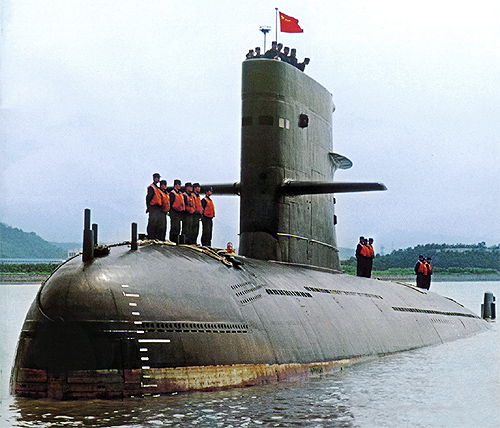Re: The Rise of the Russian Empire: Russo-Armenian Relations
The following news report is quite interesting, and its military implications are great. A Chinese navy attack submarine suddenly surfaces in the middle of a major US naval exercise involving the USS Carrier Kitty Hawk. Carrier battle groups are the crown jewels of the US military, they physically and metaphorically symbolize the might the US enjoys on the oceans of the world.
Armenian
************************************************** ******************
When the U.S. Navy deploys a battle fleet on exercises, it takes the security of its aircraft carriers very seriously indeed. At least a dozen warships provide a physical guard while the technical wizardry of the world's only military superpower offers an invisible shield to detect and deter any intruders. That is the theory. Or, rather, was the theory. American military chiefs have been left dumbstruck by an undetected Chinese submarine popping up at the heart of a recent Pacific exercise and close to the vast U.S.S. Kitty Hawk - a 1,000ft supercarrier with 4,500 personnel on board. By the time it surfaced the 160ft Song Class diesel-electric attack submarine is understood to have sailed within viable range for launching torpedoes or missiles at the carrier. According to senior Nato officials the incident caused consternation in the U.S. Navy. The Americans had no idea China's fast-growing submarine fleet had reached such a level of sophistication, or that it posed such a threat.

One Nato figure said the effect was "as big a shock as the Russians launching Sputnik" - a reference to the Soviet Union's first orbiting satellite in 1957 which marked the start of the space age. The incident, which took place in the ocean between southern Japan and Taiwan, is a major embarrassment for the Pentagon. The lone Chinese vessel slipped past at least a dozen other American warships which were supposed to protect the carrier from hostile aircraft or submarines. And the rest of the costly defensive screen, which usually includes at least two U.S. submarines, was also apparently unable to detect it. According to the Nato source, the encounter has forced a serious re-think of American and Nato naval strategy as commanders reconsider the level of threat from potentially hostile Chinese submarines. It also led to tense diplomatic exchanges, with shaken American diplomats demanding to know why the submarine was "shadowing" the U.S. fleet while Beijing pleaded ignorance and dismissed the affair as coincidence. Analysts believe Beijing was sending a message to America and the West demonstrating its rapidly-growing military capability to threaten foreign powers which try to interfere in its "backyard".
The People's Liberation Army Navy's submarine fleet includes at least two nuclear-missile launching vessels. Its 13 Song Class submarines are extremely quiet and difficult to detect when running on electric motors. Commodore Stephen Saunders, editor of Jane's Fighting Ships, and a former Royal Navy anti-submarine specialist, said the U.S. had paid relatively little attention to this form of warfare since the end of the Cold War. He said: "It was certainly a wake-up call for the Americans. "It would tie in with what we see the Chinese trying to do, which appears to be to deter the Americans from interfering or operating in their backyard, particularly in relation to Taiwan." In January China carried a successful missile test, shooting down a satellite in orbit for the first time.
Source: http://www.dailymail.co.uk/pages/liv...n_page_id=1811
The following news report is quite interesting, and its military implications are great. A Chinese navy attack submarine suddenly surfaces in the middle of a major US naval exercise involving the USS Carrier Kitty Hawk. Carrier battle groups are the crown jewels of the US military, they physically and metaphorically symbolize the might the US enjoys on the oceans of the world.
Armenian
************************************************** ******************
The uninvited guest: Chinese sub pops up in middle of U.S. Navy exercise, leaving military chiefs red-faced

Uninvited guest: A Chinese Song Class submarine, like the one that sufaced by the U.S.S. Kitty Hawk

Uninvited guest: A Chinese Song Class submarine, like the one that sufaced by the U.S.S. Kitty Hawk
When the U.S. Navy deploys a battle fleet on exercises, it takes the security of its aircraft carriers very seriously indeed. At least a dozen warships provide a physical guard while the technical wizardry of the world's only military superpower offers an invisible shield to detect and deter any intruders. That is the theory. Or, rather, was the theory. American military chiefs have been left dumbstruck by an undetected Chinese submarine popping up at the heart of a recent Pacific exercise and close to the vast U.S.S. Kitty Hawk - a 1,000ft supercarrier with 4,500 personnel on board. By the time it surfaced the 160ft Song Class diesel-electric attack submarine is understood to have sailed within viable range for launching torpedoes or missiles at the carrier. According to senior Nato officials the incident caused consternation in the U.S. Navy. The Americans had no idea China's fast-growing submarine fleet had reached such a level of sophistication, or that it posed such a threat.

Battle stations: The Kitty Hawk carries 4,500 personnel
One Nato figure said the effect was "as big a shock as the Russians launching Sputnik" - a reference to the Soviet Union's first orbiting satellite in 1957 which marked the start of the space age. The incident, which took place in the ocean between southern Japan and Taiwan, is a major embarrassment for the Pentagon. The lone Chinese vessel slipped past at least a dozen other American warships which were supposed to protect the carrier from hostile aircraft or submarines. And the rest of the costly defensive screen, which usually includes at least two U.S. submarines, was also apparently unable to detect it. According to the Nato source, the encounter has forced a serious re-think of American and Nato naval strategy as commanders reconsider the level of threat from potentially hostile Chinese submarines. It also led to tense diplomatic exchanges, with shaken American diplomats demanding to know why the submarine was "shadowing" the U.S. fleet while Beijing pleaded ignorance and dismissed the affair as coincidence. Analysts believe Beijing was sending a message to America and the West demonstrating its rapidly-growing military capability to threaten foreign powers which try to interfere in its "backyard".
The People's Liberation Army Navy's submarine fleet includes at least two nuclear-missile launching vessels. Its 13 Song Class submarines are extremely quiet and difficult to detect when running on electric motors. Commodore Stephen Saunders, editor of Jane's Fighting Ships, and a former Royal Navy anti-submarine specialist, said the U.S. had paid relatively little attention to this form of warfare since the end of the Cold War. He said: "It was certainly a wake-up call for the Americans. "It would tie in with what we see the Chinese trying to do, which appears to be to deter the Americans from interfering or operating in their backyard, particularly in relation to Taiwan." In January China carried a successful missile test, shooting down a satellite in orbit for the first time.
Source: http://www.dailymail.co.uk/pages/liv...n_page_id=1811





















Comment